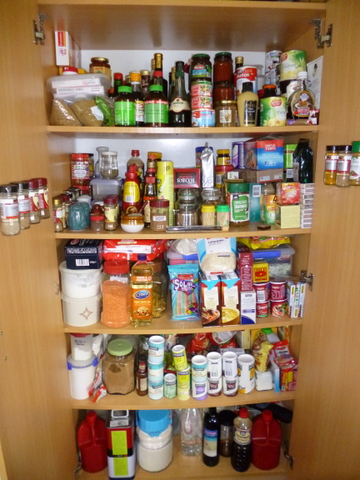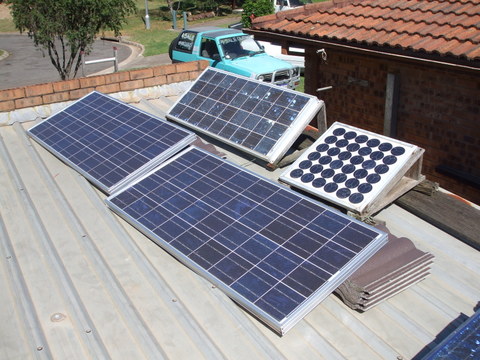One of the things our western society encourages (if not demands!) is that we should be consumers. In other words we should go out to work to earn money and then use that money to acquire what we need: food, water, shelter, energy and “stuff” in general. That is the agreement between society and the individual, you play ball with us and we’ll make sure that there are systems in place to provide for your needs, and to take your money.
However, what happens when society, for whatever reason, can’t or doesn’t keep its side of the bargain? What happens when due to a severe weather event, earthquake, financial meltdown, pandemic, civil disturbance or whatever the systems that keep us supplied, fail? The answer is that we are left out on a limb with only our own resources to count on and while this has always been the case, climate change and peak oil add an extra layer of risk.
Of course, how many resources we are left to count on when the excreta strikes the rotary cooling device is up to us. It seems to me that once we recognise our utter dependence on the consumer system and that things can, and do, go belly up regularly, there are a number of responses we can make. These responses occur along an almost infinite continuum or spectrum, but to make sense of this continuum, here are 4 waypoints along the line that may assist in understanding what our personal response might be –
- Do nothing and hope everything stays just peachy.
- Take some actions to acquire and store away some resources so that if one or more services are cut off, we have options.
- Take charge and develop our own systems where we can and use them as we develop them, so that rather than being an alternative for use in time of need, they become the way we do things.
- Head for the boonies and go self-sufficient on your own bit of heaven in the country.
Let’s examine those options a little more closely.
To me waypoint 1 at the “do nothing” end of the spectrum leaves a bit too much to chance, particularly if we have other people (spouse, kids, elderly relatives etc.) who rely on us. Yep the world is a wonderful place but things can go wrong with little or no warning and getting caught flatfooted can be anywhere between uncomfortable to severely unpleasant. While I agree with the idea of hoping for the best I believe there should be at least some preparation for if the worst happens. It might not be the end of the world, even the loss of a job can derail you temporarily and if you have made some preparation your level of comfort could be much greater.
If we elect to make waypoint 2 our objective, we are still consumers but if things get bad we can remain in a comfortable position for days or weeks (maybe even months) until the acquired resources run out. In terms of food this may translate as a supply of dried or canned food stashed away and hopefully rotated so that they will still be fresh enough to be palatable and nutritious should we need to call on them. Another way is to make food storage a lifestyle choice and follow some of the suggestions here. Likewise storing up energy such as a gas BBQ and a few LPG cylinders as well as putting away some bottled water under the house will give us options and a measure of comfort in the short to medium term.
Along with the storing up of “stuff” to increase your resilience in the face of the failure of a system (or systems) you also need to know more. While it takes little knowledge or skill to turn on a tap and access abundant fresh water (the work is done for us!) you have to know things about keeping water fresh and safe if you are going to store your own. You also need to understand how to use and maintain the systems you are setting up yourself so that in the event that the System (capital “S”) collapses, your system is in working order and you can maintain it in working order. For example the previously mentioned food storage system – you need to know enough so that you don’t buy a stack of food, store it inappropriately with no method of renewing it in place and find out it is inedible when you come to use it. It is important to learn as you develop your own systems.
With Waypoint 3 we are ceasing to be solely consumers and starting to take control and become producers. In practice this means growing (and where appropriate preserving) your own food, harvesting and using the rain which falls on your site,, building and using a rocket stove to cook with, installing solar cells and batteries to provide own energy etc. The idea is that you develop your own systems that then become the way you do things, so that you use your own harvested rainwater instead of the reticulated town water supply or build a composting toilet rather than use the sewage system.
This builds more resilience so that if a system failure occurs you can immediately fall back on your own system which in the best of possible worlds you are using anyway. If the electricity or gas goes out while you are cooking a meal on your rocket stove, it won’t affect you and a burst water main won’t affect you using water from your own tanks. Utilising your own, rather than the centrally provided systems can also save you money as well as reducing your dependence on those central systems. However, you do need to know more about setting up and maintaining resilient systems than in waypoint 1 or 2.
Waypoint 4 is at the other extreme end of the “independence from the system” spectrum from waypoint 1. The idea is that you get yourself enough land to become totally independent of the central system and then fend entirely for yourself and your family. How much land that is required to do that depends on such factors as how arable the land is, what the climate is like and what type of lifestyle you and your family aspire to. If you are a bushwalkin’, campin’ kinda family it will be a lot cheaper and easier than if you are looking for a “mansion” type of lifestyle.
Generally it takes quite a bit of cash to set yourself up to be totally independent of the system. It also takes a lot of effort as well as a large amount of knowledge and skills. Heading out to a self sufficient lifestyle in the bush straight from an inner city apartment where you bought in all your necessities is not to be recommended, although people have done it. So if this is your aim, start acquiring skills and tools NOW!
Your journey along the independence spectrum will take time and you may start out at waypoint 1 but aim for waypoint 3 or even 4. It is a fascinating and fun journey. If I was asked 30 years ago I would have told you waypoint 4 was our objective, but life gets in the way and we now make a reasonable fist of trying to live at around waypoint 3. The bottom line is that you take the precautions that make the most sense to you and which you can commit to maintain, bearing in mind that things will change over time.






